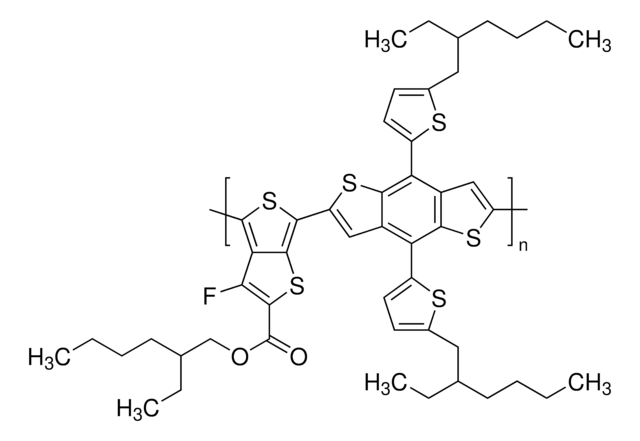772410
PTB7
average Mw 80,000-200,000, PDI ≤3.0
Synonym(s):
Poly({4,8-bis[(2-ethylhexyl)oxy]benzo[1,2-b:4,5-b′]dithiophene-2,6-diyl}{3-fluoro-2-[(2-ethylhexyl)carbonyl]thieno[3,4-b]thiophenediyl})
About This Item
Recommended Products
description
Band gap: 1.84 eV
form
solid
mol wt
average Mw 80,000-200,000
greener alternative product characteristics
Design for Energy Efficiency
Learn more about the Principles of Green Chemistry.
sustainability
Greener Alternative Product
solubility
chlorobenzene: soluble
chloroform: soluble
dichlorobenzene: soluble
λmax
680 nm (thin film)
orbital energy
HOMO -5.15 eV
LUMO -3.31 eV
Mw/Mn
2.4 +/- 0.6
PDI
≤3.0
greener alternative category
, Enabling
General description
Application
OPV Device Structure: ITO/PEDOT:PSS/PTB7 :PC71BM/Ca/Al
- JSC = 14.9 mA/cm2
- VOC = 0.75 V
- FF = 0.69
- PCE = 7.4%
Storage Class
11 - Combustible Solids
wgk_germany
WGK 3
flash_point_f
Not applicable
flash_point_c
Not applicable
Choose from one of the most recent versions:
Already Own This Product?
Find documentation for the products that you have recently purchased in the Document Library.
Articles
The development of high-performance conjugated organic molecules and polymers has received widespread attention in industrial and academic research.
Organic photovoltaics (OPVs) represent a low-cost, lightweight, and scalable alternative to conventional solar cells. While significant progress has been made in the development of conventional bulk heterojunction cells, new approaches are required to achieve the performance and stability necessary to enable commercially successful OPVs.
Professor Chen (Nankai University, China) and his team explain the strategies behind their recent record-breaking organic solar cells, reaching a power conversion efficiency of 17.3%.
Our team of scientists has experience in all areas of research including Life Science, Material Science, Chemical Synthesis, Chromatography, Analytical and many others.
Contact Technical Service







